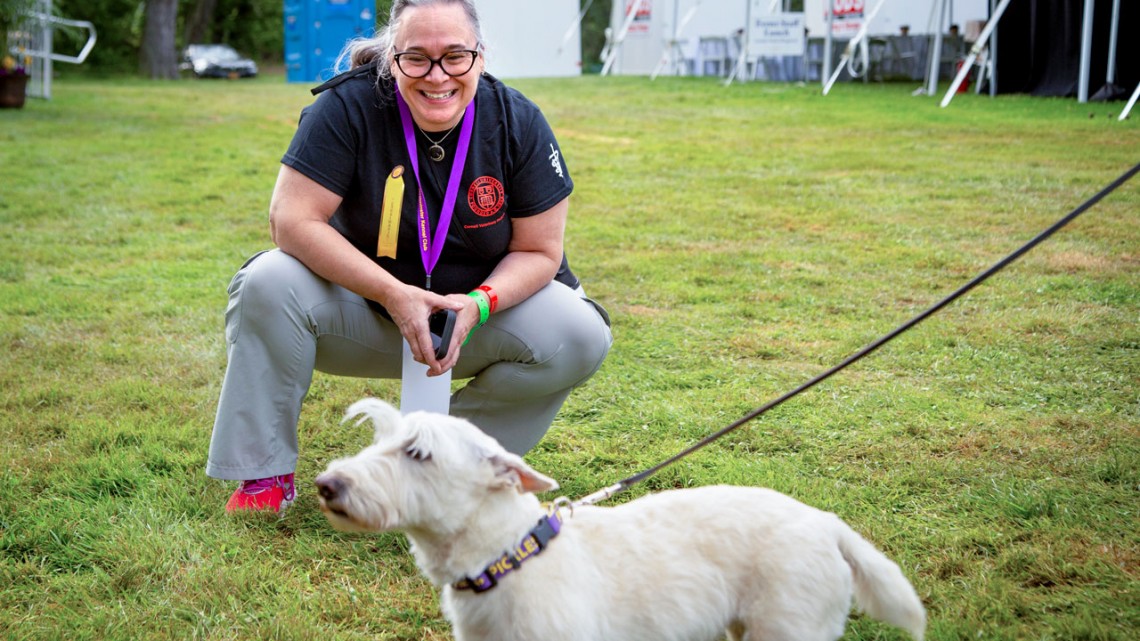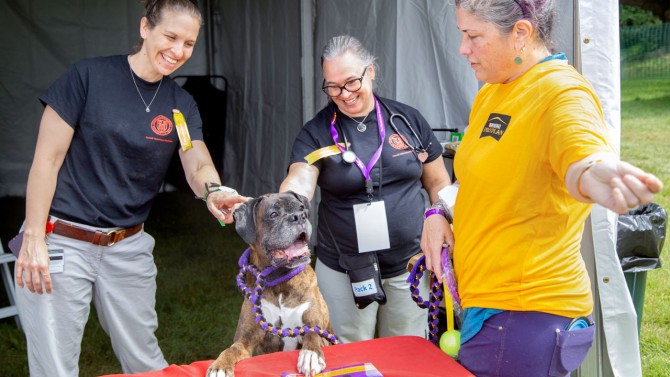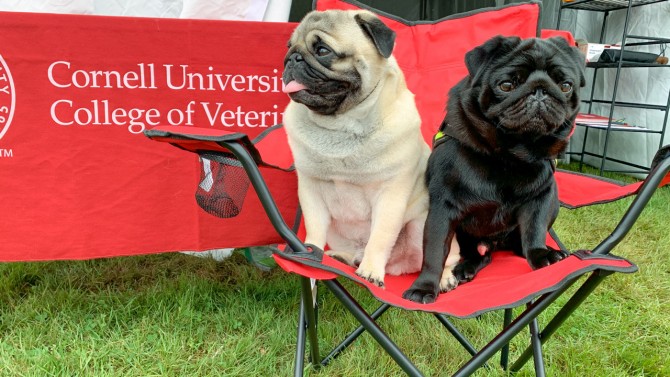
Dr. Elisa Mazzaferro, staff criticalist at Cornell University Veterinary Specialists, checks out a canine Westminster guest at the 2021 Westminster Kennel Club Dog Show.
‘The best at their best’: Veterinarians, elite dogs at Westminster
By Christina Frank
For the third year in a row, veterinarians from the College of Veterinary Medicine (CVM) provided on-site care for the most elite dogs in the world, at the Westminster Kennel Club Dog Show, June 12-13.
The vets were the show’s official veterinary care providers, offering wellness exams and medical care to the purebred dogs, coordinating medical supply preparation, shift logistics and training at the world’s longest running dog show.
For the owners of contestants that have received top-notch care from Cornell, it was especially comforting to have these vets at the show.
“I consider Cornell to be the best in the country,” says Ashley Fischer, who lives in Wilton, Connecticut, and uses the Cornell University Veterinary Specialists located there. This year, she showed her pug Rider, also known as Ch. Cado Midnight Ticket to Ride, at Westminster.
Due to the COVID-19 pandemic, the show was moved from its traditional place in Manhattan to the Lyndhurst Mansion in Tarrytown, New York; no spectators were allowed.
Rider, who was the only black dog in a sea of 32 pugs, was “a bit overwhelmed by the whole event as he is just getting started in his career in Best of Breed competition,” says Fischer. “Regardless of the results, it was a privilege to be able to show my little dog at the historic Westminster Kennel Club show. What a beautiful event it was. We were just happy to be at the party.”
Fischer’s relationship with Cornell started when her English cocker spaniel traveled to Ithaca to have a diaphragmatic hernia repaired. Another time one of her pugs needed a bowel resection due to cancer. “He was there for probably six days,” says Fischer. “They took extraordinary care of him, but they always take extraordinary care of my dogs.”
Marg Pough of Ithaca agrees. This year, her border terrier Avery – formally known as Ch. Bandersnatch Defiant ME – was in the ring at the 145th Westminster show.
She routinely brings her terriers to CVM so the students can practice giving vaccines and doing puppy exams and learn about purebred dogs. Her dogs have also participated in hip dysplasia studies and in ultrasound studies for pregnancies.
She recalls how a Cornell veterinarian would take ultrasounds of the pregnant dogs to count the puppies and predict their due dates. “And when the puppies arrived, I would tell her, ‘Yes, your count was good.’ And yes, they were born a day earlier or a day later.”
The veterinarians are grateful for the opportunities caring for this population of dogs has afforded them.
Dr. Denae Campanale, a resident in diagnostic imaging, especially values the opportunity to see pregnant dogs. “So many companion animals these days are spayed and neutered that we don’t often get to do exams on intact or pregnant animals.”
Campanale says being at the Westminster show offers a rare chance to see healthy animals and their owners in top form.
“Often as veterinarians, we’ll see our clients in really hard moments when their animals are very sick and they’re very stressed,” Campanale says. “Being at Westminster, we get to see these beautiful, healthy versions of their breeds, truly the best of the best at their best. … We got to see how close the clients were with their animals, how much they cared and the result of all of their efforts, too.”
As Best in Show judge Pat Trotter says, “Not all pets are show dogs but I can assure you that all show dogs are pets.”
Christina Frank is a freelance writer for the College of Veterinary Medicine.
Media Contact
Get Cornell news delivered right to your inbox.
Subscribe


